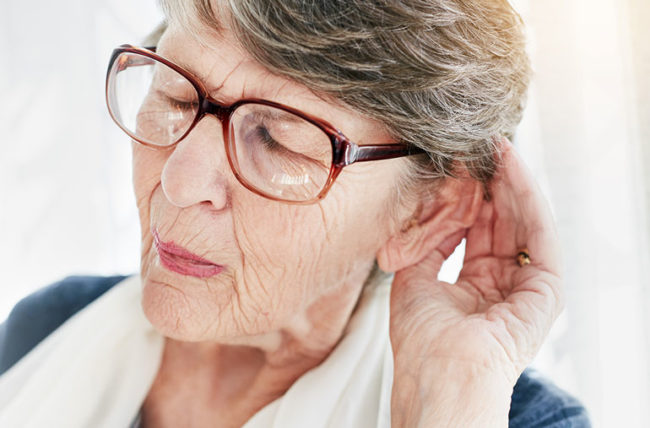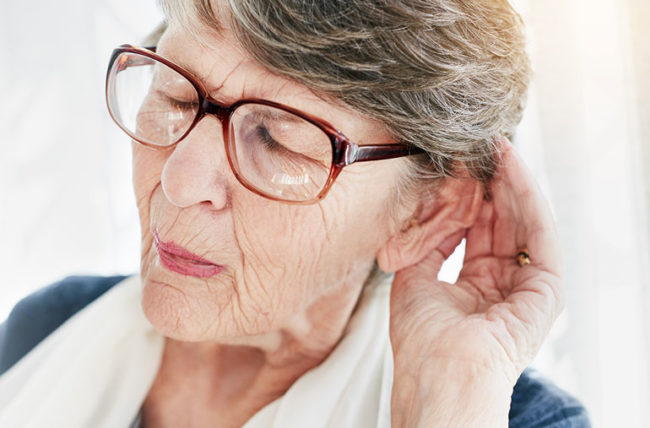When a person undergoes the process of aging, he or she experiences a large number of changes in the body through alterations in the functioning of one’s body. Hearing problem is one of such changes that one faces in the body. Approximately one in every two adults who are over 65 years or above age usually reports some amount of loss in hearing.

The term used for loss of hearing with age is also termed “presbycusis”. Though it is not a condition that can be threatening to one’s life and may have a large impact on one’s quality of life if it is not treated on time.
Loss in hearing ability that is related to one’s advancing age is caused by the slow pace of the ability to hear from both ears. It is a very common issue that occurs with age. Most people who are over 65 years old suffer from loss of hearing. Most people don’t notice until it’s too late. To avoid problems, it’s best to avoid loud sounds or noises and also, listen to music at moderate volume. Since the loss of hearing is an irreversible health condition prevention is also very important.
Symptoms related to age-linked loss of hearing ability usually begin when the person is unable to listen to high-pitched sounds. One begins to notice early symptoms when one faces difficulties in hearing normal sounds. Also, there might be some difficulty in listening to background sounds or in hearing others talk. Besides this, there may be additional symptoms that may include:
a) few sounds which are extremely loud to hear
b) difficulty in hearing voices in noisy areas
c) difficulty to differentiate between the sounds “s” and “th”
d) presence of ringing sound in ears
e) when one starts increasing the volume of television and radio set much louder than before
f) by requesting individuals to repeat their statements and
g) if one is unable to comprehend any conversations while using telephones.
What are the causes of age-related hearing loss?
Hearing loss occurs slowly over time as a person ages. Numerous changes within the inner ear can result in gradual loss of hearing. These are:
a) any changes within structural components of the inner ear
b) any alterations in the inflow of blood to the inner ear
c) any damage or impairment to nerves that are responsible for causing loss of hearing
d) any changes in the processing of speech as well as sounds by the brain
e) damage to tiny-sized hairs in the inner ear that are responsible for the transmission of sound waves to the brain.
One of the risks of aging is hearing loss. Hearing loss is associated with many health issues. It can also be caused by smoking if there is a family history of hearing loss and the person smokes a lot.
How can hearing problems be diagnosed?
If a person shows symptoms related to age-linked loss of hearing, one must consult his or her doctor for diagnosing the physical condition. The doctors perform a complete physical examination to determine if there are any other reasons for the loss of hearing. The doctors examine by looking within one’s ears by making use of an instrument known as an “otoscope”.
A doctor could present symptoms and think they’re dealing with an age-related hearing problem. They might want to see an audiologist who specializes in hearing loss. This would give a clearer idea of the extent of the hearing problem.
What is the treatment for age-related hearing problems?

At present, there is no available cure for the hearing loss associated with the process of aging. If a person has been diagnosed with this defect, one’s doctor shall be helping a person in improving their hearing along with their quality of life. For this, the doctor might be recommending
a) use of hearing aids that may help an individual to hear in a better manner
b) by advising the use of assistive appliances or devices like telephonic amplifiers and
c) by providing lessons designed in “sign language” or by training a person in “lip reading” in cases of severe loss of hearing.
In some special situations, a doctor might be recommending the use of a “cochlear” implant which is a small-sized electronic apparatus or device that can be implanted using surgery in one’s inner ear. The use of cochlear implants can allow one to hear all sounds louder than before, however, they cannot restore one’s normal levels of hearing. One must discuss with their attending doctor the available options for treatment.
How can our healthcare services help in assisting people with aging-associated hearing problems?

Centric health care services can help by providing care and consultations while recommending specialist audiologists or doctors who can perform surgical implants, wherever needed.
It might not be possible to prevent any age-related hearing problem that is related to advancing age. Hence, one must take essential steps to prevent the worsening of related symptoms with time. If someone is experiencing progressive loss of hearing due to increasing age, one must try to follow certain preventive measures such as:
a) Avoidance of repetitive exposures to high decibels of sounds
b) one must wear protective aids in the ears especially, in locations with loud levels of sound and
c) by careful control of one’s levels of blood glucose in case one has diabetes.
As there is an increase in the hearing deficit, one can also significantly lose one’s ability for understanding speech. Hence, for retaining or minimizing loss of hearing/speech it is essential to look for earlier treatment.
References
- https://www.nia.nih.gov/health/hearing-loss-common-problem-older-adults
- https://www.hopkinsmedicine.org/health/conditions-and-diseases/presbycusis
- https://www.mayoclinic.org/diseases-conditions/hearing-loss/symptoms-causes/syc-20373072


